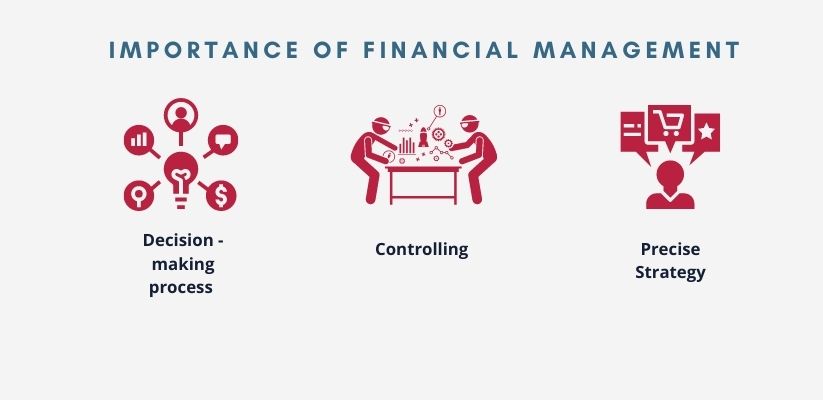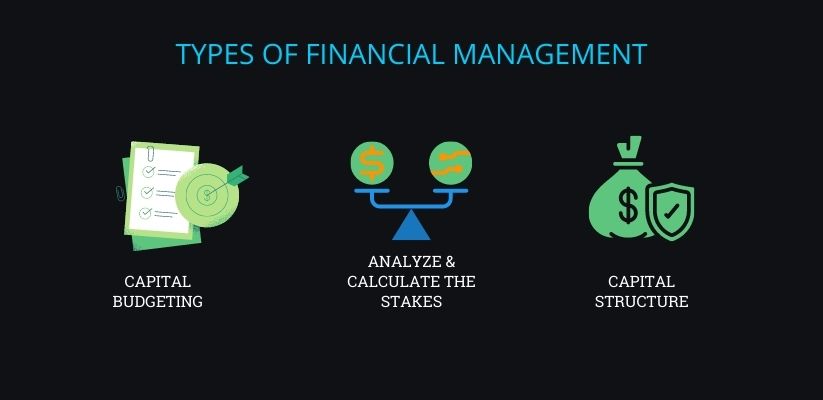Summary- Finance is the lifeline of any organization and it requires meeting the needs of all business issues. With the increasing competition in the market, companies need to face a lot of obstacles. However, with proper planning and appropriate study of financial management, the obstacles can be easily overcome. In this post, we will learn the major objective of financial management along with all the required details.

Financial management is the process of developing a business plan while making sure that all departments stay on the same page. Sturdy financial management aids the finance leaders in offering data that would support a long and vivid vision. Also, it helps leaders to make informed decisions about investing while fetching insights more on liquidity, investments, expense, and more.
With the help of the enterprise resource planning ERP software, finance teams of organizations can accomplish these goals. A perfect finance management system can easily combine various financial functions, including fixed-asset management, payment processing, and the cost of recognition.
Once you integrate these essential elements, an advanced financial management system would make sure that real-visibility exists and facilitates routine business operations such as time-end close procedures.
Prime objective of financial management to consider-
Profit escalation
An organization is usually launched with the primary goal of fetching enormous profits, which is why profit maximization is the most crucial objective of financial management. Businesses should get optimum yields in the long and short business run.
Wealth boost
The businesses are recommended to focus on increasing the value of shareholders. However, shareholders are no one but the actual owners of the organization. Since wealth maximization is the top objective of financial management, the dividend and payout policy should be fixed.
The finance executive should distribute max dividends to keep the customers happy while improving the company’s position. If the performance of the company is better, then the company will have a higher amount of market price with wealth maximization.
Liquidity maintenance
Through appropriate financial management, the leaders in the organization can track regular liquidity supply in the business. It is one major objective of financial management to help managers keep a keen eye on all outflow and inflow of money so as to lower the risk of cash overflow and underflow.
If there is a healthy cash flow, it means an increased possibility of sustenance and business success. This helps appropriately deal with uncertain situations, on-time payments, cash discounts, and processing routine delays on time.
Accurate estimation of financial needs
A prime objective of financial management is to assist financial managers in predicting the organization’s real financial needs. It includes the estimations in terms of the capital required to initiate a business, fixed capital of the company, and more. In the absence of this estimation, there will surely be a shortage of finance.
To bring such estimation in place, the finance manager considers different factors such as technology, the number of employees, legal requirements, the scale of operations, and more.
Appropriate usage of financial resources
With a proper finance management platform, businesses can utilize financial resources at their best. To accomplish this task, the financial manager can leverage various tools, including better inventory management, managing receivables, efficient policies, and more.
These tools help save a lot of expense while also reducing the wastage of resources in a single go.
<< Also Read: Top 3 key features of ERP financial management systems>>
Reduced operating task
A finance manager faces many issues, risks, and uncertainties in performing daily business functions. Another major objective of financial management is to lower the operating task.
A better finance management platform helps reduce the concerns while offering solutions to the problems. Also, this allows businesses to make informed decisions with proper thought.
Success measurement
The most significant objective of financial management of a company is to earn huge profits from the business. In short, the success of any organization lies in the revenue earned so far.
But, an advanced financial management module not just helps increase the company’s revenue but also helps measure the company’s success.
With accurate reports and accounting details, businesses can quickly analyze their last year’s performance with the current year’s performance.
<< Also Read: The Objective of Financial Management>>
Developing reserves
The business market is flooded with uncertainties, including climate change, natural disasters, frequently changing customer preferences, technology shifts, etc.
To overcome these issues, companies should always focus on forming small reserves.
With the help of dividend payout policies, companies can develop enough reserves. The reserves create not only help gain profits but also aid in dealing with unnecessary situations in the future.
Balance business structure
A robust finance management platform offers a properly balanced capital structure to the organization. In other terms, it helps bring an appropriate balance between the different capital sources, including bonds, equity, loans, gain earnings, and more.
However, these factors help gain flexibility, stability, and liquidity in the company.
It is the main objective of financial management since it systematically balances the overall structure of a company.
Significance of financial management
Financial management is the crucial platform of any business. Without proper financial planning and management, the company might face a considerable decline. So, let us have a glance at the significance of financial management.
Accurate strategy
Analyzing the business’s necessary needs to accomplish this prime objective of the organization’s financial management.
It is an essential thing to achieve long and short-term goals. This helps achieve success in the current scenario of the business.
Controlling
This element makes sure that every department has its vision and is successfully operating within budget. It also ensures that everything is in alignment with a proper strategy.
Decision-making process
This element helps business leaders make informed and best ways to execute varied plans by continuously updating financial reports and data on relevant KPIs.
With proper financial management, employees get an idea of where the company is going and better visibility in the business process.
Types of Financial Management
Capital Budgeting-
Financial management deals with identifying the organization’s financial needs to gain short-term/long-term goals.
Also, it checks where should be the capital funds expanded to support total growth.
<< Also Read: Manage Financial Risk with an ERP>>
Working capital management-
This type ensures that there is an ample amount of cash available for daily business operations. These operations include buying raw materials for production and paying workers.
Capital structure-
Capital structure helps check the way in which operations/ growth can be paid. It also reviews how to take debt. In some cases, organizations may ask for funding from a private firm, thinking about all the selling assets such as real estate and more.
STAY UPDATED
Subscribe To Our Newsletter
At Sage Software Solutions (P) Ltd., we are home to world-class ERP software and CRM software that will solidify your business tech support fundamentals and enable you to build a customer-centric organization. You can also write to us at sales@sagesoftware.co.in.
Disclaimer: All the information, views, and opinions expressed in this blog are those of the authors and their respective web sources and in no way reflect the principles, views, or objectives of Sage Software Solutions (P) Ltd.









